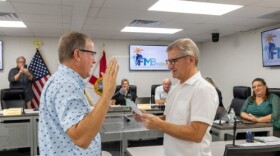Phosphate giant Mosaic is going to get its expansion in Manatee County.
It took several weeks and hearings for Manatee Commissioners to decide on the Mosaic request to expand its Wingate mine in the eastern part of the county. Before Wednesday's vote, Commission Chairwoman Betsy Benac weighed in saying what commissioners did was not "a popularity contest."
"You know, I don't like mining, but they have property rights, but mining is a specific, and I know Commissioner (Robin) DiSabatino knows this because she's a realtor, mining is a specific property right."
In the end, commissioners voted to reject certain waivers in the master mining plan, but voted 5-2 to allow Mosaic to move forward.
One commissioner expressed concern over the safety of the watershed. That includes the headwaters of the Myakka and Manatee rivers.
The Wingate East Mine, at 4,000 acres, would more than double to the current mine's roughly 3,000 acres.
You can read a background story about the Wingate Mine HERE:
Here's also a related background story from the Tampa Bay Times:
Two retired hydrologists who last week accused Mosaic and state regulators of ignoring signs of a sinkhole at a phosphogypsum plant a year before it drained polluted water into the aquifer now say they were wrong.
"We made a mistake, and we sincerely regret our error," Donald Rice and his wife, Mary Hrenda, of Parrish said in an email to the Tampa Bay Times on Tuesday.
Rice is retired from the U.S. Geological Survey and Hrenda worked for the New Jersey Department of Environmental Protection. Last week, the pair joined with the environmental group Suncoast Waterkeeper in calling for an investigation of Mosaic and the Florida Department of Environmental Protection.
The sinkhole was detected in August at the company's New Wales plant near Mulberry. It measured 152 feet wide and 220 feet deep. Officials said the hole allowed 215 million gallons of contaminated water to drain from atop a gypsum stack into the aquifer below.
After analyzing the DEP's online records regarding Mosaic's Mulberry fertilizer plant, Rice and Hrenda spotted what they thought to be a telltale sign that the sinkhole discovered in August actually started opening up in 2015.
The water level in the aquifer jumped 40 feet and they concluded the only possible explanation was solid material falling into it from inside the phosphogypsum stack.
Mosaic and the DEP said the hydrologists' findings were "fundamentally wrong."
Both said the reports the two hydrologists had examined were from a well used to monitor a 1994 sinkhole near a closed gypsum stack, not the active stack where the August sinkhole was discovered. The wells are used to monitor the closed site for underground activity, and the reports are posted on the agency's website and are available to the public.
The DEP also said the change in the aquifer was caused by Mosaic injecting grout into the closed gypsum stack. However, Mosaic has declined to answer questions about why grout is being pumped into that closed gypsum stack. A DEP spokeswoman said the company was doing it to deal with "subsurface erosion" within the stack.
Copyright 2020 WUSF Public Media - WUSF 89.7. To see more, visit . 9(MDAyMTYyMTU5MDEyOTc4NzE4ODNmYWEwYQ004))








